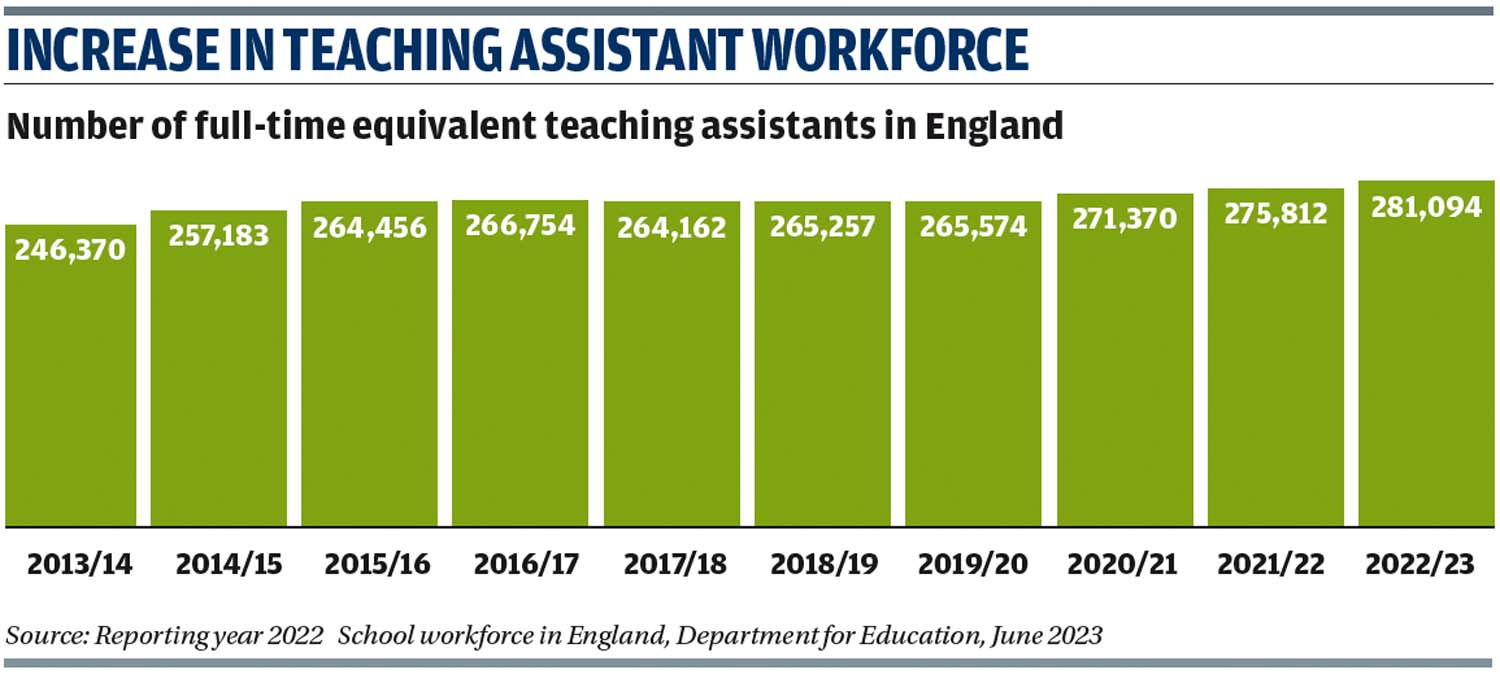
A Barnardo's report on mental health support in schools, published earlier this year, found most of its practitioners had seen an increase in wellbeing issues among children and young people in the past year. A survey in September 2022 found about three quarters of young people that took part would like to see more mental health support in schools.
Meanwhile, in February 2023 the Disabled Children's Partnership said gaps in provision across education, health and social care were contributing to ill health in seven out of 10 disabled children.
Pressures are also taking their toll on staff. The National Education Union's 2023 survey of education support staff found three quarters are working extra hours, mostly due to the demands of their workload. Half said there has been a reduction in their numbers over the past year.
Sencos
All mainstream schools are required to have a Senco to support pupils with special education needs and disabilities (SEND). Sencos are qualified teachers who work with school leaders, advise colleagues and co-ordinate specific provision.
In March 2023 the government published its SEND and Alternative Provision Improvement Plan, introducing a new leadership-level Senco National Professional Qualification (NPQ), which will effectively replace the current mandatory National Award for SEN Co-ordination qualification.
Training is offered by the National Association of Special Educational Needs (Nasen), including accredited courses such as a Level 3 and 4 SEND Casework Award and Youth Mental Health First Aid. For teachers and support staff it offers a Recognised Teacher or Practitioner of SEND course and provides training resources through its Whole School SEND Consortium.

Teaching assistants
Teaching assistants (TAs) are involved in supporting SEND pupils. The government's SEND plan, promises a “longer term approach” to the role to “ensure their impact is consistent across the system”. A research project will look at evidence of success in schools as well as issues such as demand for TA support.
TA training is on offer from Maximising TAs, including courses on helping to improve pupil independence and sessions for school leaders to improve the impact of TAs. It also offers a Level 3 team leader/supervisor apprenticeship course for TAs. This 12-month programme is aimed at TAs as well as learning support assistants and includes four modules spread across eight online seminars.
Tutoring
The National Tutoring Programme was set up to help children catch up on lost learning due to the Covid-19 pandemic, with tutors and academic mentors providing extra support in schools.
The scheme is still running in schools but the Department for Education is gradually phasing out funding. In 2020/21 the DfE subsidised up to 75 per cent of the costs of providing tutoring but that dropped to 25 per cent in 2023/24. After 2023/24 schools will be expected to fund tutoring themselves, such as through their pupil premium budget for disadvantaged students.
Training for school staff through the programme is offered by the Education Development Trust and recognised by the Chartered College of Teachers. After completing their training, tutors and academic mentors can access a series of webinars providing guidance on delivering tutoring in schools.
In 2022, an Ofsted review of tutoring found sessions taught by qualified teachers were of a higher quality than those taught by other types of tutors, such as TAs.
Senior mental health leads
Efforts to boost mental health support in schools include recruiting and training senior mental health leads to develop whole-school approaches to mental health and wellbeing. These could be a school leader, such as a head teacher or deputy head teacher, or another member of staff.
The DfE's £1,200 training grant is intended to cover training costs for leads and hiring supply staff when they are learning. Courses are available at DfE-approved colleges and providers.
Other roles
Through its SEND implementation plan the government plans to invest £21m to train two further cohorts of educational psychologists in 2024 and 2025 in partnership with NHS England. This will fund 400 more trainees. For 2023, £10m had been made available to train 200 trainees.
According to the Careers and Enterprise Company young people's “career readiness” improves when they receive careers education at school. The company offers training courses for careers leaders, including an online induction and face-to-face sessions. More specialist careers guidance offered by the company includes parental engagement training to involve families in careers provision.
A report released in June by the House of Commons education committee called for an updated careers strategy from government “with clear and measurable targets and actions”. Committee chair Robin Walker MP called for careers education to be incorporated into training for teachers and Sencos due to its importance for young people.
Teachers can specialise in taking personal, social, health and economic (PSHE) education in schools including relationship and sex education. The PSHE Association runs a number of virtual courses, with this year's sessions including courses in the autumn on puberty, drug and alcohol use and tackling sexual harassment.

